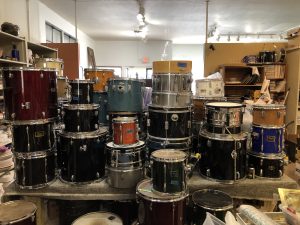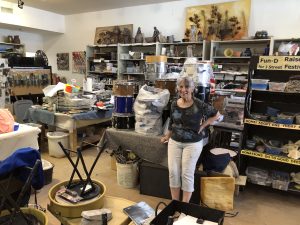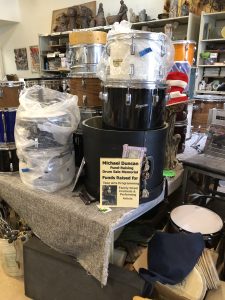
As legacies go, the late area drummer Michael Duncan’s is unique and profound.
Duncan died from complications with the human papillomavirus (commonly called HPV) in 2020 at age 64 after having worked with local blues, rock and country music acts including The Hellhounds, Tucker Brothers, Night Train, and the Wild Bushmen.
And he left behind a treasure trove of drum equipment, much of it stored in multiple West Palm Beach warehouses — the volume of which surprised even his widow, local singer, guitarist and songwriter Kat Mahoney. An entire drum kit previously owned by iconic veteran drummer Tommy Aldridge (Black Oak Arkansas, Pat Travers Band, Whitesnake), was housed there in cases still emblazoned with Travers’ logo.
Married for nearly 20 years to North Carolina native Duncan, Mahoney spent much of 2020-2022 selling off her husband’s hundreds of valuable snare drums while figuring out what to do with his mountainous remainder of gear.
Which explains why, amid the works of a multitude of local three-dimensional visual artists, there’s also several stacks of Duncan’s drums at the Clay Glass Metal Stone Gallery in Lake Worth Beach. The sale of the drums is part of an effort to save the building and the Flamingo Clay Studio (flamingoclaystudio.com), the non-profit artist cooperative that runs the familiar downtown site at 15 S. J Street.
“It really is an enduring reminder of Michael,” says Flamingo Clay Studio executive director Joyce Brown. “Kat also donated thousands of his Hot Wheels toy cars, which we’ve sold a lot of.”
“I donated quite a few of Michael’s drums to the gallery,” Mahoney says. “I also donated a lot of Michael’s equipment to Lake Worth High School. Then the gallery ended up getting a portion of it that the school decided not to use on top of that original donation.”
Mahoney speaks by phone from her West Palm Beach home shortly after returning from her family farm in Kentucky in early January. Before becoming a snowbird, she’d performed at the gallery several times, plus teamed with Brown to present and perform historical tribute shows to iconic folk music singer/songwriters like Woody Guthrie, Pete Seeger, and Phil Ochs at the nearby Lake Worth Playhouse.

Most of Duncan’s drums are tom-toms, which get mounted on top of a drum set’s larger bass drums, plus larger, self-explanatory floor toms. Most were made by the Japanese company Pearl, with a few other older drums produced by American manufacturer Rogers. And while most are in a stack that’s large enough to view in the back room as you enter the gallery, a few smaller stacks are on shelves within its nooks.
“There isn’t a school in the area that needed instruments that didn’t get some from Kat,” Brown says. “These are all partial drum sets, and we’ve sold seven or eight of them. We’ve told prospective buyers they only need to give us half of whatever the prices listed are.”
Still, the resulting thousands of dollars have constituted only a drop in the bucket of what the gallery needs to survive. It was being charged an affordable $1,000 a month by its supportive landlord, Rachel Gwinn, before she died suddenly in 2017 without any heirs. The building has been put up for sale by her estate, with the gallery a potential buyer, as evidenced by the Building Fund link on its website.
But with developers driving up prices of local properties, the asking price now hovers around $555,000. The Flamingo Clay Studio was already priced out of its additional previous site, a 4,000-square-foot warehouse nearby, when it was sold during the height of the COVID-19 pandemic. And pricing is only part of the battle for Brown and her collective of artists.

“We had a $100,000 challenge grant, but the donor backed out when we reached it,” Brown says. “She said she’d decided it wasn’t in her best interests. Everything we sell goes into the Building Fund, minus expenses. If she hadn’t backed out, we would’ve had enough to buy at this point. We’ve had more than 400 donations of between $10 and $25 from artists and arts supporters who can barely afford it, which we certainly appreciate. But what we really need now are donations of $10,000 or more.”
Brown says that not knowing the estate didn’t have proper business licensing has created additional problems.
“They didn’t actually have the right to rent us this building, because they hadn’t renewed their business license,” she says. “So even though we renewed every year, ours was never officially in effect because they never actually had one. Now we have a court date coming up where the estate will evict us in two weeks if we don’t take care of our latest code violation. We have a storage shed out back with all tents and barriers for events in it. And it isn’t bothering anyone else, but the city says it’s illegal and can’t be permitted.”
Standing next to Duncan’s drum collection, Brown spoke January 12 while a couple of artists work nearby. All of them were focused on the gallery’s upcoming Martin Luther King Day celebration in three days, one for which Brown hoped Mahoney would be back in South Florida in time to perform live. A creative commemorative portrait of MLK by Doug Harris adorned the gallery’s front window.
They all have a dream as well; one of the nonprofit purchasing the building and eventually expanding the gallery by adding a second story to house the actual studio. But the clock is ticking, and hopefully not toward an unwanted wake-up call.
The Flamingo Clay Gallery is located at 15 S. J St. in Lake Worth Beach, and open from 9 a.m.-3 p.m. every day except Tuesdays, when it’s closed. Visit flamingoclaystudio.com for more information on its Building Fund and to donate through its direct Community Foundation link. For further information, call 561-598-8344.